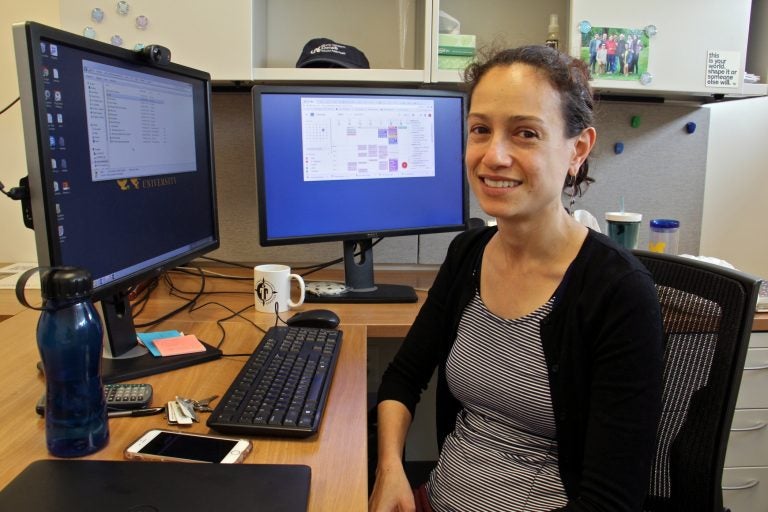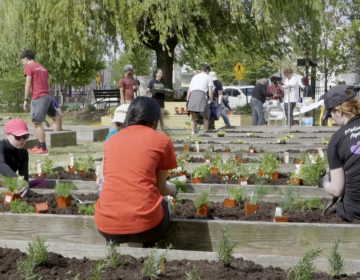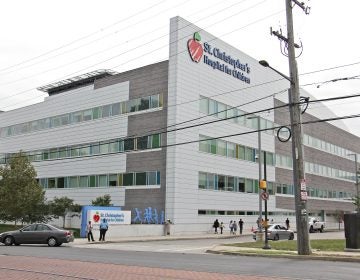Parents’ scars from childhood trauma can affect their kids’ health, researchers find
The research showed that with each additional ACE that a parent experienced, a child had 17 percent higher odds of having been diagnosed with asthma.
Listen 2:57
Drexel University researcher Félice Lê-Scherban looked at the impact of adverse childhood experiences (ACEs), which are being found in the children of those who suffered traumatic events during childhood. (Emma Lee/WHYY)
In a city filled with stories of struggle, Angela Sutton’s stands out.
Her childhood in Germantown was particularly difficult.
When she was just 8 years old, Sutton’s father started raping her.
When she was 14 years old, she was shot in the stomach inside a corner store after an argument broke out between two men.
“I just remember feeling like somebody threw gasoline on me and lit a match,” she said. “I felt like my body was literally on fire. I just wanted to die.”
Two years later, she started living in an abandoned house, then a car to escape her abusive father.
These days, she says life is better, more peaceful, but not without hardship. Even with her new job as a toll collector, it’s not easy to make ends meet. Her sons’ health also looms large. Both of them have a history with asthma and have had serious health scares as a result.
“My oldest one, he was in the hospital. They had to mix some steroids up because the regular steroids weren’t working. They could not get him to breathe. They were talking about giving him immediate surgery,” said Sutton, a member of Witnesses to Hunger, an anti-poverty program based at Drexel University.
There’s a field of science dedicated to studying how “adverse childhood experiences” – the traumatic things that happen to people as young children – negatively affect their physical health later in life.
New research out of Drexel University shows there may be a similar relationship between how traumatic a parent’s childhood was and how healthy their kids are, even years after they’re born.
The study, recently published in the journal Pediatrics, says there’s no direct link — Sutton’s boys don’t have asthma because she was shot and raped as a child — but the results reveal it’s more likely there is a connection.
“We found that children of parents who’d experienced more ACEs, when the parents were children, those children had higher odds of poor overall health status, as reported by the parent, and higher odds of asthma and were more likely to watch too much television,” said Félice Lê-Scherban, one of the Drexel professors behind the study.
The research showed that with each additional ACE that a parent experienced, a child had 17 percent higher odds of having been diagnosed with asthma.
“This compounds for parents who have experienced far more ACEs,” added Lê-Scherban.
The study is based on self-reported responses from 350 Philadelphia parents during a roughly two-month span. The vast majority – 80 percent – were women. Most of them were either African-American or white. Researchers didn’t directly ask about socioeconomic status.
Nearly half of the sample said they’d witnessed violence as a child. More than a third said they’d been physically abused as child.
Experts say the study’s relatively “novel” findings could lead to longer-term research charting the impact of ACEs on children over multiple years.
“We need to be quite concerned. This is something that could be affecting a large swath of the population,” said Susan Marshall Mason, who studies community health at the University of Minnesota.
This study and others have not been able to explain why the link exists, though Lê-Scherban says this correlation means city officials, service providers, and medical professionals need to try to protect children from experiencing trauma now so their children have a better shot at being healthy.
In the meantime, Angela Sutton is trying to reverse the tide on her own. She said her sons have been much healthier since they left the mouse-infested apartment in Olney, a more violent neighborhood of Philadelphia than the one where she lives now. And since she got that toll collector job, she can afford to buy them better food.
“My job is to show them that everything that I went through I survived so I could be able to help do better and make better choices,” said Sutton.
WHYY is your source for fact-based, in-depth journalism and information. As a nonprofit organization, we rely on financial support from readers like you. Please give today.





